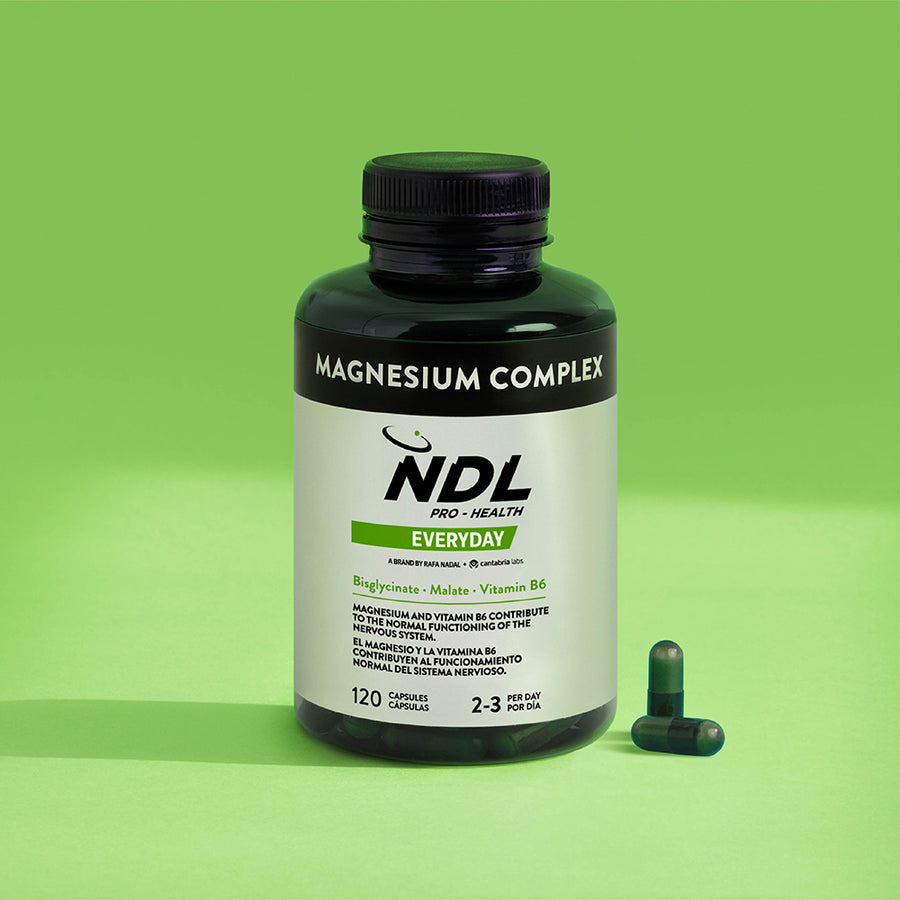Featured Products

Triple Magnesium
See productMagnesium is an essential mineral for the body, involved in hundreds of physiological processes—from energy production to nervous system regulation and muscle function. However, not all forms of magnesium are equal in terms of absorption and benefits.
In this article, we’ll explore what magnesium glycinate is and what it’s used for, how it differs from other forms, its key benefits, and how to properly incorporate it into your daily routine to support your health and well-being.
What is Magnesium Glycinate?
Magnesium glycinate is one of the most bioavailable and well-tolerated forms of magnesium. It’s created by binding magnesium with glycine, a non-essential amino acid that also acts as an inhibitory neurotransmitter in the nervous system. This combination improves magnesium absorption in the body and reduces the laxative effects seen with other forms.
Differences compared to other magnesium forms:
Magnesium comes in various forms, each with different absorption rates and effects:
- Magnesium oxide: high in elemental magnesium but poorly absorbed (around 4%). Commonly used as a laxative or antacid.
- Magnesium citrate: better absorbed than oxide with moderate laxative effects. Useful for occasional constipation and digestive health.
- Magnesium chloride: dissolves well in water and is easily absorbed, though its bitter taste and laxative effect can be drawbacks.
- Magnesium lactate: well absorbed and often recommended for mild magnesium deficiency.
- Magnesium taurate: bonded to taurine, offering additional cardiovascular benefits.
- Magnesium threonate: studied for its ability to cross the blood-brain barrier and support cognitive function.
Each form has specific properties and benefits, so choosing the right one depends on your supplementation goals.
Magnesium glycinate stands out for its high absorption and excellent gastrointestinal tolerance, making it a top choice for improving muscle function, sleep quality, and general wellness—without digestive side effects.
What is Magnesium Glycinate used for?
Now that we understand the basics, let’s look at what magnesium glycinate is used for and its main benefits:
-
Improves sleep quality: Magnesium glycinate is known for its ability to promote relaxation and enhance restful sleep. This happens because:
- It acts on the parasympathetic nervous system, reducing neural excitation and promoting calm.
- It supports melatonin production, the hormone that regulates the sleep-wake cycle.
- It enhances the activity of GABA, a neurotransmitter that helps achieve deeper, more restorative sleep.
It’s a great option for people with insomnia, trouble falling asleep, or frequent nighttime awakenings.
-
Supports muscle function and prevents cramps: Magnesium is essential for proper muscle contraction and relaxation. A deficiency can lead to muscle weakness, cramps, and spasms.

Magnesium glycinate helps maintain mineral balance and supports proper nerve transmission to prevent cramps. It also reduces muscle fatigue and improves recovery after exercise.
It’s ideal for athletes or anyone prone to cramps or muscle fatigue.
-
Promotes bone health: Magnesium glycinate plays a vital role in bone formation and maintenance:
- It aids in calcium and vitamin D absorption and metabolism, both critical for bone density.
- Helps prevent bone demineralization and osteoporosis, especially in older adults or postmenopausal women.
- Supports collagen production, a key component of bones and joints.
Regular intake can strengthen bones and help prevent degenerative bone conditions.
-
Supports digestive health: Unlike other forms such as citrate or chloride, magnesium glycinate does not cause laxative effects at normal doses, making it suitable for sensitive digestive systems.
It relaxes muscles in the digestive tract and promotes healthy bowel movements without discomfort. It’s especially helpful for people with irritable bowel syndrome (IBS) or stress-related digestive issues.
It doesn’t cause fluid retention or interfere with the absorption of other nutrients.
Supplementing with magnesium glycinate is an effective strategy for improving overall well-being—without the digestive side effects often associated with other forms.
How to take Magnesium Glycinate
To get the most benefit from magnesium glycinate, it’s important to know the right dose, timing, and possible combinations with other supplements.
The ideal dosage varies depending on individual needs. The recommended daily intake (RDI) of magnesium varies by age and sex:
| Group | Recommended Magnesium Intake (mg/day) |
|---|---|
| General adults | 200–400 mg |
| Athletes | 300–500 mg |
| People with magnesium deficiency | 400–600 mg |
Do not exceed 600 mg per day without medical supervision, as excessive magnesium can cause digestive upset.
When is the best time to take it?
The best time to take magnesium glycinate depends on your goal:
- To improve sleep: before bed (30–60 minutes prior).
- For muscle recovery in athletes: after workouts, along with protein or amino acids.
- To enhance nutrient absorption: in the morning, ideally with breakfast.
- To reduce stress: split into two doses, taken in the morning and afternoon.
It can be taken with or without food. Those with sensitive digestion may prefer to take it with meals.
Combining with other supplements
Magnesium glycinate can be combined with other nutrients for greater effect:
- Vitamin D: enhances the absorption of magnesium and calcium, supporting bone and muscle health.
- Zinc: complements magnesium in immune function and muscle recovery. Best taken at different times to avoid absorption interference.
- Vitamin B6: boosts magnesium’s effects on the nervous system and stress regulation.
- Calcium: essential for bone health, but should be balanced with magnesium intake to avoid reduced absorption.
- L-theanine or GABA: when combined with magnesium glycinate, they enhance relaxation and improve sleep quality.
Choosing the right dose and timing can maximize benefits for sleep, muscles, stress, and bone health. Combining with nutrients like vitamin D, zinc, or B6 further enhances its effectiveness for overall well-being.
In conclusion, magnesium glycinate stands out for its excellent absorption and tolerance. It offers key benefits for sleep, stress, muscle, bone, and digestive health. When taken correctly and combined with the right nutrients, it’s a safe and effective choice for supporting daily wellness—without unwanted side effects.

From the NDL Pro-Health team we will provide you with tips to maintain a healthy lifestyle. Sharing knowledge and product recommendations to offer optimal solutions for your daily routine, for your workouts and subsequent recovery, all with the goal of helping you achieve physical and mental wellness.

















